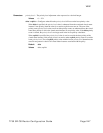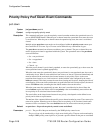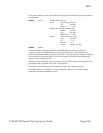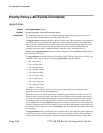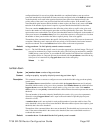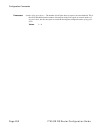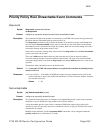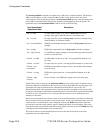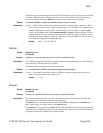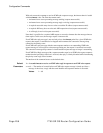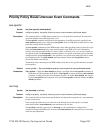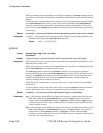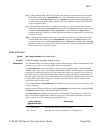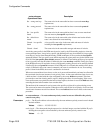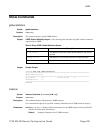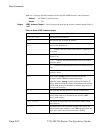VRRP
7750 SR OS Router Configuration Guide Page 255
The no form of the command deletes the specific IP host monitoring event. The event may be deleted
at anytime. When the event is deleted, the in-use priority of all associated virtual router instances
must be reevaluated. The event’s hold-set timer has no effect on the removal procedure.
Default no host-unreachable - No host unreachable priority events are created.
Parameters ip-addr — The IP address of the host for which the specific event will monitor connectivity. The ip-
addr can only be monitored by a single event in this policy. The IP address can be monitored by
multiple VRRP priority control policies. The IP address can be used in one or multiple ping
requests. Each VRRP priority control host-unreachable and ping destined to the same ip-addr is
uniquely identified on a per message basis. Each session originates a unique identifier value for
the ICMP echo request messages it generates. This allows received ICMP echo reply messages to
be directed to the appropriate sending application.
Values 1.0.0.0 — 223.255.255.255
interval
Syntax interval seconds
no interval
Context config>vrrp vrrp-policy-id>priority-event>host-unreachable ip-addr
Description This command configures the number of seconds between host unreachable priority event ICMP echo
request messages directed to the host IP address.
The no form of the command reverts to the default value.
Default 1 — 1 second between ICMP echo request messages to the target host.
Parameters seconds — The number of seconds between the ICMP echo request messages sent to the host IP
address for the host unreachable priority event.
Values 1 — 60
timeout
Syntax timeout seconds
no timeout
Context config>vrrp vrrp-policy-id>priority-event>host-unreachable ip-addr
Description This command defines the time, in seconds, that must pass before considering the far-end IP host
unresponsive to an outstanding ICMP echo request message.
The timeout value is not directly related to the configured interval parameter. The timeout value
may be larger, equal, or smaller, relative to the interval value.
If the timeout value is larger than the interval value, multiple ICMP echo request messages may be
outstanding. Every ICMP echo request message transmitted to the far end host is tracked individually
according to the message identifier and sequence number.



